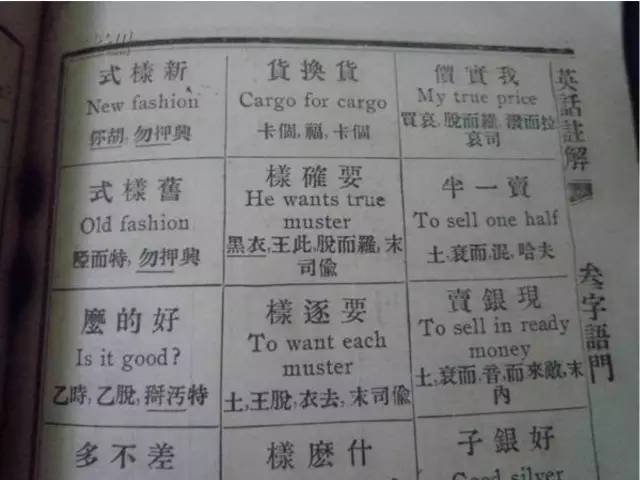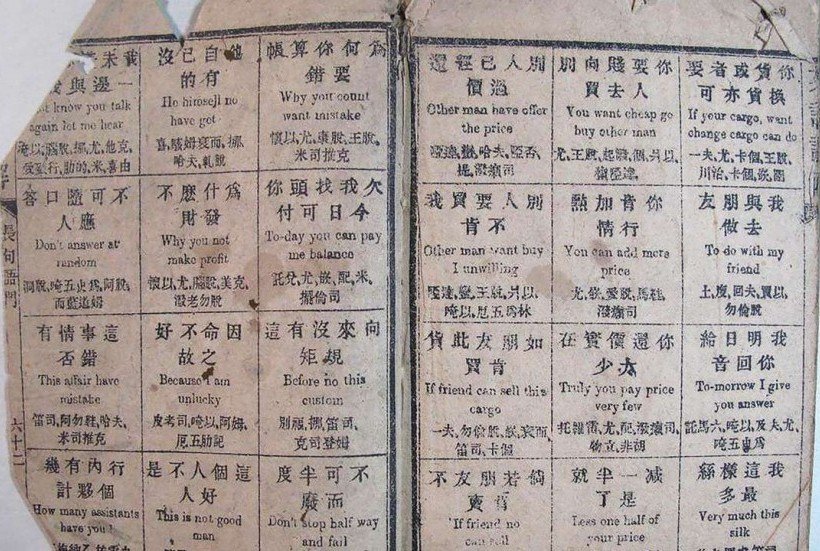Mandarin Monday: How to Speak Qing Dynasty Chinglish
If you think Chinglish sounds funny now, you should've heard it back in the Qing dynasty.
Just imagine going to a market and having one of that bygone era's port city merchants shouting "yǐshí yǐtuō gǔwūtè (乙时.乙脱古污特)?" to ask "Is it good?" in regards to his products, or "tǔ sāiér hùn hāfū (土.赛而 .混 .哈夫)" in order "to sell one half" of something.
As goofy as those phonetic Chinese renderings of English may seem, they were a common way for many Mainlanders to get a grasp on the odd sounds of English, especially in the era before local residents were familiar with the roman alphabet or pinyin (which would not be commonly adopted almost a century).
A collector in Chengdu recently unveiled what he claims is an 1860s-era phrasebook that aided merchants in communicating with English-speaking foreigners.
In the document the original Chinese phrase is accompanied by a Chinglish-y translation, and finally a series of characters to help with its pronunciation. Given the number of phrases that make little sense, it's a miracle that any commerce was successfully completed at all.
One page of the book declares it was published in “The 10th year of the Xianfeng Emperor,” or about 1860. The text's characters are written in traditional Chinese, rather than the simplified form currently used by most mainlanders.
We've written out some of these mind-bending phrases in English, Qing dynasty Chinglish, pinyin and simplified Chinese, so you too can speak English like a mid 19th Century Chinese merchant.
Perhaps studying them will help you get the best of your neighborhood vendor during your next negotiation.
By the way, this methodology is not entirely lost to sands of time; many beginners still use this method in their first English classes. Pass by a local grammar school and listen to how many students call out "gǔ dé máoníng" (古德毛宁) i.e. "good morning!" for proof of that.

Is it good? 好的么? hǎo de me?
乙时.乙脱.古污特? yǐshí yǐtuō gǔwūtè?
New fashion 新样式 xīn yàngshì
你胡.勿押兴 nǐhú wùyāxìng
My true price 我实价 wǒ shí jià
买哀.脱而丝.泼面拉哀丝 mǎiāi tuōérsī pō miàn lā āi sī
To sell one half 卖一半 mài yībàn
土.赛而.混.哈夫 tǔ sāiér hùn hāfū
If you think those phrases are less than useful, we've also made up some handy guidelines for pronouncing some more contemporary English:
Hey, how are you doing?
黑,浩.儿.宇.读英? hēi, hào er yǔ dúyīng?
I want a beer
爱.王.他.比尔 ài wáng tā bǐ'ěr
You are an asshole
鱼儿安哎四侯了 yú er ān āisìhóule
Can you buy me an iPhone?
看.鱼.白米.安.哎风? kàn yú báimǐ ān āifēng?
My, you are quite obese
卖,宇.而.快特.噢必死 mài, yǔ ér kuàitè ōbìsǐ
Chew your food before you swallow
去.宇儿.负的.比佛.宇.死瓦楼 qù yǔ'er fùde bǐfo yǔ sǐwǎlóu
I hate you
爱.黑特.宇 ài hēitè yǔ
Bae, you make me horny
白,宇.每颗.米.号你 bái, yǔ měikē mǐ hàonǐ
I like the Beijinger a lot
爱.来克.地.北京儿.阿.拉特 ài láikè dì Běijīng'er ā lātè
READ:
Photos: Guide in China, SCMP
Related stories :
Comments
New comments are displayed first.Comments
![]() admin
Submitted by Guest on Thu, 12/15/2016 - 08:03 Permalink
admin
Submitted by Guest on Thu, 12/15/2016 - 08:03 Permalink
Re: Mandarin Monday: How to Speak Qing Dynasty Chinglish
爱 物的 来客 白 低俗 不可。好 嘛吃 福尔 湾 靠皮
hahaha
![]() admin
Submitted by Guest on Tue, 11/29/2016 - 11:32 Permalink
admin
Submitted by Guest on Tue, 11/29/2016 - 11:32 Permalink
Re: Mandarin Monday: How to Speak Qing Dynasty Chinglish
爱玩他比尔 ai wan ta bi'er might be a bit closer
Validate your mobile phone number to post comments.








